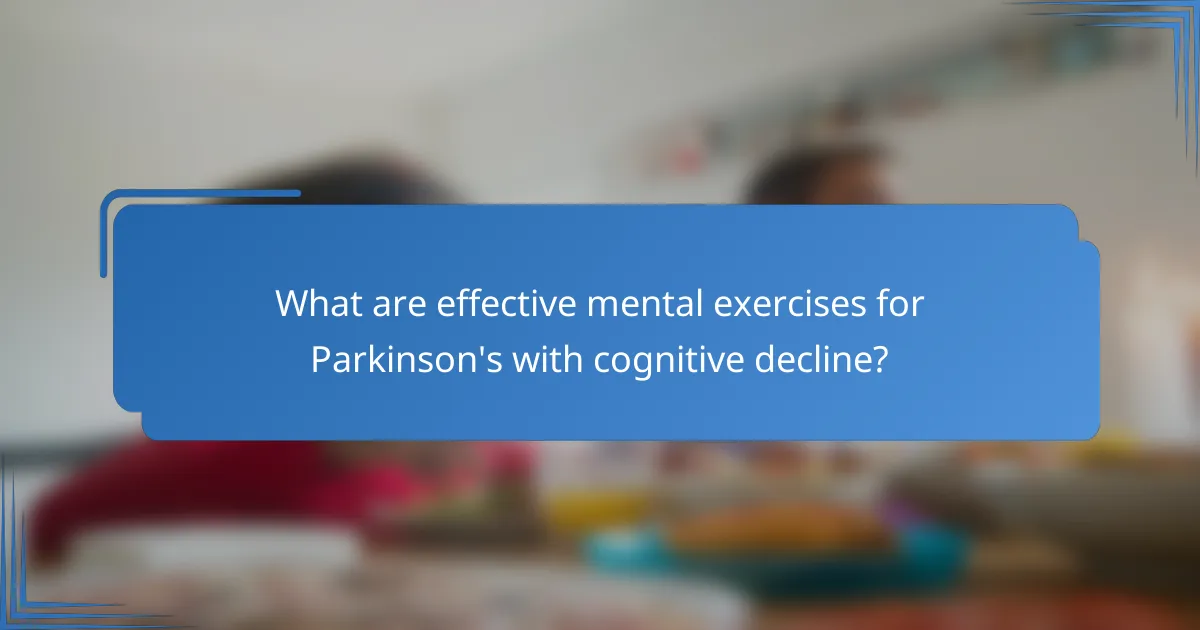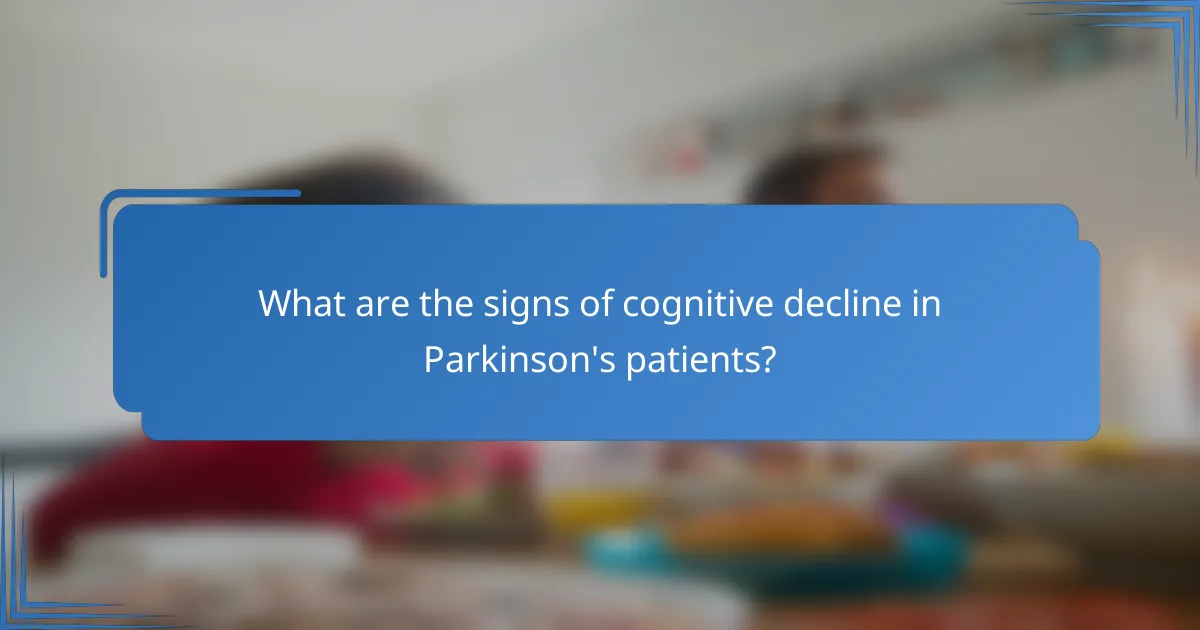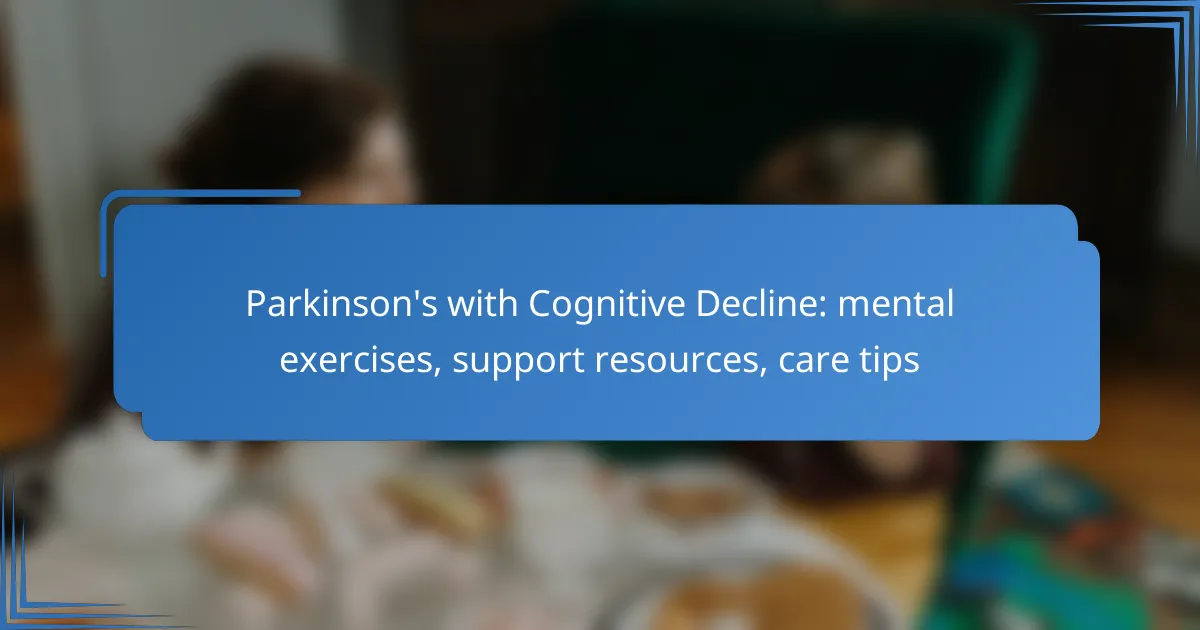Parkinson’s disease often comes with cognitive decline, making it essential to engage in effective mental exercises that can enhance cognitive function and improve overall quality of life. Support resources in New Zealand, including local groups and online platforms, offer valuable community and emotional assistance for those affected. Caregivers play a crucial role by understanding these challenges and providing tailored support to foster a better living experience for both themselves and those they care for.

What are effective mental exercises for Parkinson’s with cognitive decline?
Effective mental exercises for individuals with Parkinson’s and cognitive decline can enhance cognitive function and improve quality of life. These exercises include a variety of activities designed to stimulate the brain, promote mental agility, and support overall cognitive health.
Cognitive training apps
Cognitive training apps are digital tools designed to improve memory, attention, and problem-solving skills. Popular options include Lumosity and Elevate, which offer tailored exercises that adapt to the user’s performance level. Regular use of these apps can provide engaging ways to challenge the brain and track progress over time.
Puzzles and games
Puzzles and games such as crosswords, Sudoku, and card games can be beneficial for cognitive stimulation. These activities encourage critical thinking and can be easily integrated into daily routines. Setting aside time each day for these games can help maintain mental sharpness and provide a fun way to engage with others.
Memory exercises
Memory exercises can include techniques like visualization, association, and repetition to enhance recall. Simple activities such as memorizing a short list of items or practicing recall of recent events can strengthen memory pathways. Incorporating these exercises into daily life can help reinforce cognitive skills progressively.
Mindfulness practices
Mindfulness practices, such as meditation and deep breathing, can improve focus and reduce stress, which is beneficial for cognitive health. Engaging in mindfulness for just a few minutes each day can enhance mental clarity and emotional well-being. Consider using guided meditation apps or local classes to establish a routine.
Physical activities
Physical activities, including walking, dancing, or yoga, have been shown to positively impact cognitive function. Regular exercise increases blood flow to the brain and can improve mood and mental clarity. Aim for at least 150 minutes of moderate exercise each week to support both physical and cognitive health.

What support resources are available in New Zealand?
In New Zealand, various support resources exist for individuals with Parkinson’s and cognitive decline, focusing on community, information, and emotional assistance. These resources include national organizations, local support groups, and online platforms that foster connection and information sharing.
Parkinson’s New Zealand
Parkinson’s New Zealand is a key organization dedicated to supporting individuals affected by Parkinson’s disease. They provide a wealth of resources, including educational materials, advocacy, and access to healthcare professionals. Their website offers information on managing symptoms and living well with Parkinson’s.
Additionally, they organize events and workshops that promote awareness and provide opportunities for social interaction among those impacted by the condition. Engaging with Parkinson’s New Zealand can help individuals feel less isolated and more informed about their health journey.
Local support groups
Local support groups across New Zealand offer a vital space for individuals with Parkinson’s and their caregivers to connect and share experiences. These groups typically meet regularly and provide emotional support, practical advice, and a sense of community.
To find a local support group, individuals can visit the Parkinson’s New Zealand website or contact their regional offices. Participating in these groups can help reduce feelings of loneliness and provide valuable coping strategies.
Online forums
Online forums serve as an accessible resource for individuals with Parkinson’s and cognitive decline, allowing them to connect with others from the comfort of their homes. These platforms facilitate discussions on various topics, including symptom management, caregiving tips, and personal experiences.
Popular online forums include those hosted by Parkinson’s New Zealand and other health-related websites. Engaging in these forums can provide support and insights from a broader community, making it easier to navigate the challenges of Parkinson’s disease.

How can caregivers provide effective support?
Caregivers can provide effective support by understanding the unique challenges faced by individuals with Parkinson’s and cognitive decline. This involves employing tailored communication techniques, establishing consistent routines, and offering emotional support to enhance the quality of life for both the caregiver and the person receiving care.
Communication strategies
Effective communication is crucial for caregivers supporting individuals with Parkinson’s. Use clear, simple language and maintain eye contact to ensure understanding. Avoid overwhelming the person with too much information at once; instead, break down conversations into manageable parts.
Encourage the individual to express their thoughts and feelings, and practice active listening by repeating back what you hear to confirm understanding. Non-verbal cues, such as gestures and facial expressions, can also enhance communication.
Routine establishment
Establishing a daily routine can provide structure and stability for individuals with cognitive decline. Consistent schedules help reduce anxiety and confusion, making it easier for them to navigate daily tasks. Aim for a balanced mix of activities, including physical exercise, mental stimulation, and relaxation.
Consider using visual aids, such as calendars or checklists, to reinforce the routine. This can help the individual anticipate upcoming activities and foster a sense of independence. Regularly review and adjust the routine to accommodate changing needs or preferences.
Emotional support techniques
Providing emotional support is essential for caregivers. Be present and attentive, offering reassurance and validation of feelings. Encourage social interactions with family and friends to combat feelings of isolation.
Engage in activities that the individual enjoys, whether it’s listening to music, watching movies, or participating in hobbies. These enjoyable experiences can significantly boost mood and overall well-being. Remember to practice self-care as a caregiver, as your emotional health is vital for providing effective support.

What are the best products for cognitive support?
The best products for cognitive support include tools designed to enhance mental function, assistive technology for daily tasks, and memory aids that help with recall. These resources can significantly improve the quality of life for individuals with Parkinson’s and cognitive decline.
Brain training tools
Brain training tools are designed to stimulate cognitive functions such as memory, attention, and problem-solving. Popular options include apps and online programs that offer exercises tailored to various skill levels. Look for platforms that provide a range of activities, from puzzles to memory games, to keep engagement high.
When selecting a brain training tool, consider ease of use and accessibility. Many programs are available on smartphones or tablets, making them convenient for daily practice. Aim for sessions of 10-20 minutes several times a week to see benefits.
Assistive technology
Assistive technology encompasses devices and software that aid individuals in performing daily tasks. Examples include voice-activated assistants, reminder apps, and specialized communication devices. These tools can help manage routines and reduce frustration associated with cognitive decline.
When choosing assistive technology, assess the specific needs of the individual. For instance, a smart home device can automate tasks like turning off lights or adjusting thermostats, while reminder apps can help with medication schedules. Ensure that the technology is user-friendly and provides adequate support.
Memory aids
Memory aids are practical tools that assist with recall and organization. Common examples include calendars, to-do lists, and sticky notes placed in prominent locations. These aids can help individuals with cognitive decline stay on track with daily activities and appointments.
To maximize the effectiveness of memory aids, establish a consistent routine for their use. For instance, keep a calendar in a visible spot and update it regularly. Encourage the use of color coding or symbols to enhance visual memory cues, making it easier to remember important tasks and events.

What are the signs of cognitive decline in Parkinson’s patients?
Cognitive decline in Parkinson’s patients can manifest through various symptoms, including changes in memory, attention, and problem-solving abilities. Recognizing these signs early can help in managing the condition effectively.
Memory loss indicators
Memory loss in Parkinson’s patients often presents as difficulty recalling recent events or conversations. Patients may struggle with remembering names or appointments, which can lead to frustration and confusion.
Common indicators include forgetting where items are placed, repeating questions, or having trouble following conversations. These memory issues can be subtle at first but may progress over time, impacting daily life.
To support memory retention, consider using memory aids such as calendars, reminder apps, or sticky notes. Establishing a routine can also help reinforce memory by providing structure to daily activities.
